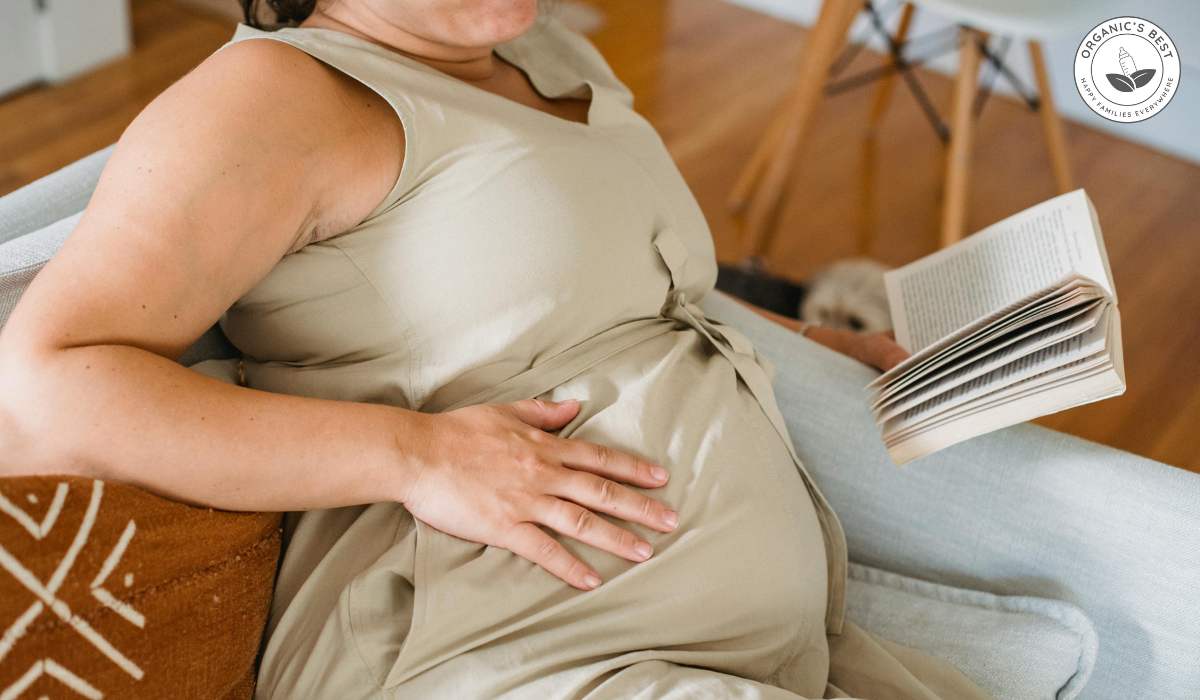Click to Get 2 FREE Boxes/Cans
Click to Get 2 FREE Boxes/Cans
Only New Customers! Click HERE to Get 2 Extra Boxes/Cans for Free With Your First Order.
Only New Customers! Click HERE to Get 2 Extra Boxes/Cans for Free With Your First Order.
BABY FORMULA
Offering new parents top-quality European infant formula from renowned brands like HiPP, Holle, Kendamil, and more. If you’re uncertain about which product to choose, our Formula Finder can help you make the best decision for your baby.
Baby Food
Offering new parents a premium selection of European baby foods, including jars, pouches, cereals, and snacks from esteemed brands like HiPP and Holle.
Pregnancy After 40: What to Expect When Having a Baby at 40+
by Agustina Fernandez November 04, 2025 9 min read

In today's world, many women are choosing to have children later in life, whether it's to focus on their careers, pursue personal growth, or find the right partner to build a family with. Others may also face fertility challenges that naturally delay the journey to motherhood.
The truth is, everyone's path looks different, and if becoming a mom a little later in life ends up being part of yours, that's completely okay.
That said, it's important to acknowledge that pregnancy after 40 does come with its own set of risks and unique challenges.
In this article, we'll explore what those are and how older moms are navigating pregnancy symptoms, managing risks, and embracing motherhood at age 40 and beyond!
Table of Contents
- Late Motherhood: What is Considered Advanced Maternal Age?
- Are Pregnancy Symptoms Different in Your 40s?
- Chances of Getting Pregnant at 40
- What are the Risks of Pregnancy After 40?
- Preparing Your Body for Pregnancy Over 40
- Benefits of Becoming a Parent Later in Life
- Final Thoughts: Embracing Getting Pregnant at 40+
Late Motherhood: What is Considered Advanced Maternal Age?
When doctors talk about advanced maternal age, they're referring to pregnancies that occur at age 35 or older. While the term might sound a little intimidating, it's really just a medical way of flagging that certain risks, like high blood pressure or gestational diabetes, become slightly more common after this age.
Women over 40 face unique challenges when trying to conceive and carry a pregnancy, largely due to the natural decline in both egg quantity and quality.
That's because by age 40, most women have only about 3% of their original egg supply remaining. That said, fertility technology has come a long way, thanks to options like IVF, egg freezing, and genetic testing; more women than ever are having healthy pregnancies well into their 40s.
In fact, women are having children later than ever. The average age of first-time mothers has risen from about 21 in the 1970s to nearly 30 today, and the number of women giving birth in their 40s has more than doubled in recent decades. It's a clear sign that late motherhood is becoming less of an exception and more of a modern norm.
With proper prenatal care, a balanced pregnancy diet, and regular monitoring, most women of advanced maternal age can still have healthy pregnancies and healthy babies.
When it comes to late motherhood, the American College of Obstetricians and Gynecologists (ACOG) emphasizes the importance of consistent prenatal checkups and early screening tests to track both maternal and fetal health.
While it's true that high-risk pregnancy ages may require a bit more medical attention, being a bit older is also often paired with emotional maturity, financial stability, and a deeper sense of readiness, all of which definitely matter when it comes to raising a tiny human.
Are Pregnancy Symptoms Different in Your 40s?
One of the ways that pregnancy at 40 looks a little different is due to the symptoms. The symptoms and signs of pregnancy over 40 are sometimes more intense, sometimes less noticeable, and often easily confused with perimenopausal changes.
For the most part, women in their 40s experience the same early pregnancy symptoms as younger women, but their bodies may respond differently due to hormonal shifts, metabolic changes, and lower estrogen and progesterone levels.
Weird Early Pregnancy Symptoms Over 40
Here's a closer look at what to expect:

Fatigue That Hits Hard: Feeling bone-deep exhaustion early in pregnancy is common at any age, but women over 40 often describe it as next-level tired. That's because your body is already managing lower baseline energy levels, slower metabolism, and fluctuating hormones from perimenopause.
Changes in Skin and Hair: Pregnancy hormones often bring a glow, but older moms sometimes notice mixed effects. Increased estrogen can improve skin tone and thickness, but slower cell turnover may also lead to dryness or pigmentation changes, such as melasma. Hair might feel thicker at first, but some women experience shedding post-pregnancy due to shifting hormone levels.
Aches and Pains: Your joints, lower back, and hips may start feeling sore earlier due to a combination of hormonal relaxation of ligaments and age-related stiffness. Many describe it as a dull ache, especially in the lower abdomen and lower back, as the uterus begins to expand.
Missed Periods and Cycle Confusion: Here's where things can get confusing. Perimenopause and pregnancy share a lot of overlapping symptoms, such as missed or lighter periods, fatigue, and even night sweats. Many women don't realize they're pregnant right away because cycle irregularity at this age is common. When in doubt, test, as it's far from rare for pregnancy to happen even when you thought your cycle was winding down.
Chances of Getting Pregnant at 40
A woman is born with all the eggs she'll ever have, which is around one to two million at birth, but by puberty, that number drops to about 300,000.
From the mid-30s onward, both egg quantity and quality decline more rapidly, which can delay conception and increase the risk of chromosomal abnormalities.
Research looking into the impact of age on fertility states that "At the age of 30, there is a 75% chance to conceive in the first 12 months. This chance declines to 66% at the age of 35 and 44% at the age of 40."
That might sound discouraging, but it's important to remember that "average" is not synonymous with "impossible". Many women conceive naturally in their early 40s with careful timing, healthy habits, and patience.
The reason fertility declines over time comes down to biology. As we age, not only do egg numbers decrease, but the eggs that remain are more likely to have chromosomal abnormalities, making fertilization and implantation more difficult.
Hormonal fluctuations, especially in estrogen, progesterone, and follicle-stimulating hormone (FSH), can also affect ovulation regularity.
Beyond egg health, the uterine environment can change slightly with age, sometimes making it harder for embryos to implant successfully.
Lifestyle factors like smoking, stress, and poor nutrition can accelerate this decline, while maintaining a healthy weight, balanced diet, and regular exercise can help support reproductive health longer.
For women who have been trying to conceive for six months or longer without success, it's often a good time to talk with a fertility specialist. After 40, time becomes an important factor, and early intervention can make a big difference.
Treatments like in vitro fertilization (IVF), intrauterine insemination (IUI), or egg freezing and donor eggs have helped many women achieve successful pregnancies later in life.
What are the Risks of Pregnancy After 40?
To sum up the risks, women over 40 face a higher chance of developing conditions such as gestational diabetes, high blood pressure, or preeclampsia, as well as experiencing preterm birth or low birth weight.
The risk of miscarriage and chromosomal abnormalities, including Down syndrome, also rises with age due to changes in egg quality.
For instance, the chance of having a baby with a chromosomal condition increases from about 1 in 1,250 at age 25 to roughly 1 in 100 at age 40.
Managing these risks begins with proactive prenatal care. Regular checkups allow your healthcare provider to monitor blood pressure, blood sugar levels, and fetal growth closely throughout your pregnancy.
When it comes to screenings, your doctor may recommend noninvasive prenatal testing (NIPT), which analyzes fetal DNA in the mother's blood to screen for chromosomal abnormalities as early as 10 weeks.
Other common assessments include ultrasound nuchal translucency scans, amniocentesis, or chorionic villus sampling (CVS) if more detailed information is needed. These are somewhat more invasive so are only used if there is a higher risk of certain conditions.
Preparing Your Body for Pregnancy Over 40
When you're planning to have a baby in your 40s, preparation becomes just as important as the pregnancy itself.
Your body is capable and wise, but it may need a little extra help to create the best possible environment for conception and a healthy pregnancy.
Taking the time to strengthen your body, balance your hormones, and nourish yourself with the right nutrients can help your body and mind support the growth of your infant.
Healthy Lifestyle Changes to Boost Fertility

First and foremost, maintaining a healthy weight can significantly impact fertility. Both underweight and overweight ranges can disrupt ovulation and hormone balance. Regular, moderate exercise, like brisk walking, swimming, or yoga, supports circulation, reduces stress, and helps regulate menstrual cycles. Extreme exercise, on the other hand, can have the opposite effect.
Nutrition plays a big part, too. A fertility-friendly diet is rich in whole foods, colourful vegetables, lean proteins, healthy fats, and complex carbohydrates. Think Mediterranean-style eating. Limiting alcohol, caffeine, and processed foods can also improve hormonal function and reproductive health.
Equally important is managing stress and sleep. High cortisol levels can interfere with ovulation and make it harder for your body to conceive. Incorporating mindfulness, breathing exercises, or gentle movement can help calm the nervous system.
Aim for 7-9 hours of restorative sleep each night, since quality sleep regulates hormones like melatonin, estrogen, and progesterone, which are all crucial for fertility.
Recommended Vitamins and Supplements
By your 40s, your nutrient stores might need a little boost to support egg quality, hormone regulation, and overall reproductive health. A high-quality prenatal vitamin should be your foundation, even before conception. Here is a list of vitamins and supplements that help support pregnancy:
Please note that prenatal supplements contain various vitamins, some of which are listed below.
Folate (Methylated Folate): Supports early fetal development and helps prevent neural tube defects. The methylated form is easier for your body to absorb and use effectively.
Iron: Promotes healthy red blood cell production and oxygen delivery, which supports ovulation and overall energy levels.
Vitamin D: Crucial for hormone regulation, immune function, and egg quality. Low levels are linked to fertility challenges.
Omega-3 Fatty Acids (DHA + EPA): Help regulate hormones, reduce inflammation, and support early brain and eye development once pregnant.
Coenzyme Q10 (CoQ10): Improves egg quality by supporting mitochondrial energy and protecting reproductive cells from oxidative stress.
Vitamin C: Acts as an antioxidant that supports egg and sperm health while strengthening your immune system.
Probiotics: Support gut and vaginal health, which can improve nutrient absorption and create a balanced environment for conception.
It's best to discuss supplements with your healthcare provider, who can tailor recommendations based on your individual health and lab results.
Benefits of Becoming a Parent Later in Life

While much of the conversation around having children in your 40s focuses on the challenges, the advantages are just as great. Becoming a parent later in life often comes with emotional depth, stability, and a broader perspective that younger parents might not yet have.
You've lived, learned, and likely built a solid foundation for yourself and your family, and when it comes to raising a child, that experience matters more than you might think.
One of the greatest benefits of having children later in life is emotional maturity. By your 40s, you usually have a stronger sense of who you are and what truly matters.
Many women also report feeling more emotionally equipped to handle the ups and downs of parenthood, from sleepless nights to toddler meltdowns, because they've already weathered life's other storms.
You're also more likely to have financial stability, career security, and a better understanding of how to manage money and time.
Final Thoughts: Embracing Getting Pregnant at 40+
Pregnancy after 40 isn't just possible, it's increasingly common, empowering, and, for many women, deeply fulfilling. While it may come with a few extra considerations, it also arrives at a time in life when confidence, emotional strength, and self-awareness are at their peak.
Across the world, countless women are rewriting what motherhood looks like. Some become first-time moms after years of focusing on their careers, others after navigating fertility challenges or second marriages.
Celebrities like Julianne Moore, Meryl Streep, Gwen Stefani, and Nicole Kidman have shared their journeys of becoming mothers later in life, but it's not just public figures embracing this path. Every day, women are doing it too, with teachers, artists, business owners, nurses, and stay-at-home moms, carving out their own version of what family means.
If you're considering pregnancy in your 40s, know that you're not alone, and you're not "too late." With modern medical care and fertility support, many women in their 40s go on to have smooth pregnancies and healthy babies.
|
Disclaimer: Please be aware that this information is based on general trends in babies, and it is not medical advice. Your doctor should be your first source of information and advice when considering any changes to your child’s formula and when choosing your child’s formula. Always consult your pediatrician before making any decisions about your child’s diet or if you notice any changes in your child. Breastfeeding is the best nutrition for your baby because breast milk provides your child with all the essential nutrients they need for growth and development. Please consult your pediatrician if your child requires supplemental feeding. |
Agustina Fernandez
Dr. Agustina Fernandez earned her medical degree from the prestigious Universidad Nacional de Córdoba, Argentina. With a deep-rooted passion for pediatrics, Dr. Fernandez is currently on the path to specializing in children's healthcare. Recently, she has delved into the vital field of infant nutrition. Her research interests include breastfeeding, infant formula, and baby food in little ones’ formative years. Dr. Fernandez's commitment to this area of study underscores her dedication to ensuring the health and well-being of children from their earliest days.
Leave a comment
Comments will be approved before showing up.
Also in Organic Infant Nutrition and Health Blog

10 Winter Activities for Kids and Toddlers
by Agustina Fernandez January 06, 2026 8 min read
Read More
How to Choose The Best Infant Formula: A Guide to EU Organic Formulas
by Agustina Fernandez January 05, 2026 14 min read
Read More
Best Formula for Breastfed Babies 2026 Guide
by Agustina Fernandez January 05, 2026 15 min read
Read More